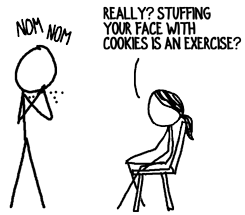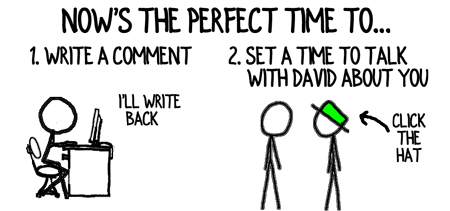Confidence is to selling consulting as phyllo dough is to making baklava: necessary for success but difficult to maintain in the real world. Below, I outline two confidence-building exercises specifically designed for consultants.

As a purveyor of consulting services you regularly swallow large doses of rejection—prospective clients often claim they don’t need your offering. If you’re an independent consultant running a solo firm or boutique, each rebuff stings all the more because you are promoting your own ideas, expertise and experience. It’s personal in the extreme, and the negative feedback rattles many consultants’ confidence.
Here’s the question: does inner fortitude meaningfully sway your rain-making as a consultant? A clue is hidden in a study by Don Moore at Carnegie Mellon.** His research showed that people purchasing advice tend to choose the more confident source, even when that source had a poor track record! Holy cow. Some dude who doesn’t deliver high-quality results wins the gig because he’s more confident?!
We can do something about that. No doubt you’ve read about improving self-assuredness through exercise, a daily dose of sunshine, and vocabulary-expansion. Plus, there’s evidence that striking a power pose before tackling an important task improves your performance. Terrific. Go for it.
But let’s address your aplomb while selling consulting services, specifically. From what I’ve seen, effectively employing confidence in our business rests on four traits, all of which you can practice: Belief, Projection, Intention and Poise.
- Belief: Holding complete faith in your heart and mind that what you are offering is valuable. If you don’t believe in your value, your prospects are likely to doubt your worth too.
- Poise: Navigating challenges to your position with sang-froid. If you are unwilling or unable to consider opposing points of view you will be perceived as insecure or arrogant, not confident
- Projection: Telling others that what you offer has value. Silence certainty is not the recipe for a fat wallet. You have to proclaim your value boldly, with compelling vocabulary and a convincing tone.
- Intention: Displaying your value with the intent to inform and help. In contrast, if your motivation is to impress and sell, that will shine through, casting your statements as unappealing braggadocio and puffery.
The exercises below will build your strength and endurance across all four traits.
Sharpen & Spar Exercise (Practice 1x/month)
- Sharpen: Integrate some new concept, framework or approach related to your area of expertise. A simple distinction or learning is fine. Becoming a neurosurgeon is taking the idea too far. Approach your Sharpening in a structured way; i.e., write notes, catalog your learning, and integrate it into your practice well enough that you can teach it to prospects.
Rationale: Every new, relevant idea you master in this fashion is a concrete addition to your toolkit and bolsters your belief in your value.
- Spar: Solicit input on your new idea from three or four people whom you wouldn’t normally consider experts in the subject and who have contentious personalities. Handle all their suggestions and objections with thoughtful consideration.
Rationale: It’s (relatively) easy to accept pushback from people we respect and admire, but in this exercise you will learn to maintain equanimity when someone with questionable insight challenges the ideas you’ve painstakingly crafted.
Amateur Assist Exercise (Practice 1x/week)
- Choose a non-business activity that you enjoy and would be willing to engage in with others. You’re looking for an area where your performance is better than average but you’re not a superstar. As an example, for me this would be ice skating. Most people can’t skate at all, whereas I can stride athletically until I crash into the other side of the rink.
- Find a friend, colleague or total stranger who also participates in your chosen activity. Offer to help that person using language similar to, “I’m good at skating. May I help you?” Do NOT add caveats or downplay your ability in any way when you say you are good. Pay attention to your tone (project confidence) and intention (are you trying to impress?).
Rationale: You are becoming comfortable projecting value with confidence even when you’re “not the best.” You’ll find that you can, in fact, deliver tremendous value even if you’re not a superstar. You’re also ingraining the habit of offering your services with the intention that attracts clients.
How has improved confidence affected your ability to win consulting projects? Please post one example below of when you felt on top of your game and won a great gig. Then reward yourself with a slice of baklava.**
Text and images are © 2024 David A. Fields, all rights reserved.

 David A. Fields Consulting Group
David A. Fields Consulting Group 

thanks for sharing your insight. confidence plays a significant role in consulting everyday. it is our bread and butter, the foundation of our value.
You’re welcome, Linda. Thank you for posting your thoughts!
Thanks David, another brilliant article. I love the idea of a power pose. I usually take a few deep breaths before something different or challenging, or even just when something is new. I do a good percentage of my work alone in my office, and have a habit of standing up and moving around every 30-45 minutes. Will now add the power pose to my routine!
I just scheduled time in my calendar for the exercise. THANKS!
That’s terrific, Lisa. Post a picture of your power pose!! Good for you for getting up and moving around every 30-45 minutes. Do you find that just getting your body into motion contributes to your confidence at all or is it just a good way to stay focused?
Sorry David, a photo is probably not forthcoming as I am usually not “ready for prime time” when working at my desk. 😉 Once again, your questions are worth a million words – I had not thought about my routine of movement being about confidence, but agree that it does contribute, especially now that I have incorporated the power pose you suggested. (Still need to find a good source for baklava, tho I do make a great oatmeal cookie.)
Other ways that my movement break contributes to self-confidence:
– getting another, usually larger, perspective by just moving away from holding onto the current work helps me to remember the bigger picture
– knowing that it’s okay to take a break, to refresh, re-focus also helps with the bigger picture
– when I am frustrated with progress on one thing, doing another reminds me that I am okay, and human. This is similar to your Amateur Assist exercise above
Thanks again! Lisa
Thanks for suggesting additional ways that movement works for you. Your comments are very instructive. (We’ll let you slide on he photo. Not being “ready for prime time” is the prerogative of an independent consultant!)
Great article David and love the idea of taking someone ice skating, as your prowess in this area is very similar to mine. Also love your straight-forward approach to improvement, very glad to have found you! Thank you, Greg
As long as you have padding for your body (and ego), any activity in which you have a modicum of ability is a great forum for practicing your confidence building.
I’m equally glad you’re reading and posting, Greg!